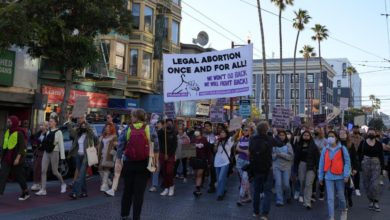Three important anniversaries in the international struggle for women’s self-determination have recently taken place.
In the United States, rightto-choose advocates celebrated in January the 35th anniversary of the momentous Roe v.
Wade decision. This February, Portugal celebrates the one-year anniversary of a popular referendum that legalized abortion, and Canada commemorates 20 years of no legal restrictions on abortion.

March for women’s reproductive
rights, Washinton, D.C., April 2004.
Each of these anniversaries marks a milestone in the struggle for women’s liberation, yet each offers a plethora of evidence that even when women win certain legal rights under capitalism, those rights are ultimately insufficient. For working women, the battle for the right-to-choose and self-determination is far from won.
In 1973, the women’s struggle in the United States won the right to choose, codified in the historical Roe v. Wade Supreme Court decision. Thirty-five years later, women must still defend that right. On April 18, 2007, the Supreme Court upheld a law misleadingly known as the “Federal Partial-Birth Abortion Ban.” Their blatant attack on women’s right to control our own bodies criminalized second-trimester abortions regardless of circumstances or risk to a woman’s life.
The 2007 decision perpetuates paternalistic language placing women at a lower social standing. It implies women are incapable of making decisions about our own bodies.
Certain U.S. states have laws that enforce a waiting period or counseling prior to obtaining an abortion. For many working-class women, the burden of these requirements can be financially, physically and mentally insurmountable.
In February, the Colorado Senate unsuccessfully attempted to pass a bill mandating a 24-hour waiting period. Women in areas where medical care is available once a week would have had to wait longer than 24 hours, which could lead to complications. According to the Colorado chapter of NARAL Pro-Choice America, the waiting period would have impacted women living in the 78 percent of Colorado counties that have no abortion provider.
In 1969, Canadian women won the right to an abortion, but only if a board of three doctors agreed that a pregnancy endangered a woman’s well-being. Their persistent struggle yielded the 1988 R. v. Morgentaler ruling, which struck down all laws regulating abortions.
In theory, R. v. Morgentaler granted all women in Canada the right to choose an abortion. In practice, however, the reality is far from that.
According to Canadians for Choice, a national pro-choice organization, only 15.9 percent of Canada’s hospitals provide accessible abortion services today. Some provinces, such as Prince Edward Island, have no abortion facilities. Most hospitals and clinics that do offer the procedure are located in large urban areas. This effectively limits access for women in rural areas, women who cannot afford to travel, and the many women living on reservations.
Statistics from Portugal debunk the right-wing hysteria and lies used to curtail women’s rights. A popular referendum legalized abortions one year ago, and the law became effective six months later. The number of abortions in public hospitals since then has been about 40 percent less than the inflated figures the right-wing had projected.
Regardless of whether actual numbers were lower than projections, the number of women who received proper and safe procedures certainly increased. It would be safe to say that many women’s lives were saved over the last year because of the legalization of abortions.
According to a study published on one of the websites of the respected medical journal The Lancet, the criminalization and restriction of abortions does not lower the rate of abortions; it only increases the number of unsafe procedures performed on women. It states that approximately 5 million women worldwide are admitted to a hospital every year for complications of a botched procedure. This statistic does not include the many thousands of women who die from unsafe backroom procedures.
On the anniversary of Roe v. Wade, pro-choice activists throughout the United States countered right-wing rallies and their message of hate and repression. The continued attack on women’s right to choose shows that the struggle for women’s liberation remains relevant.
The voices of women and their allies in the streets declaring that we will not go back is what will move us forward towards true liberation.





